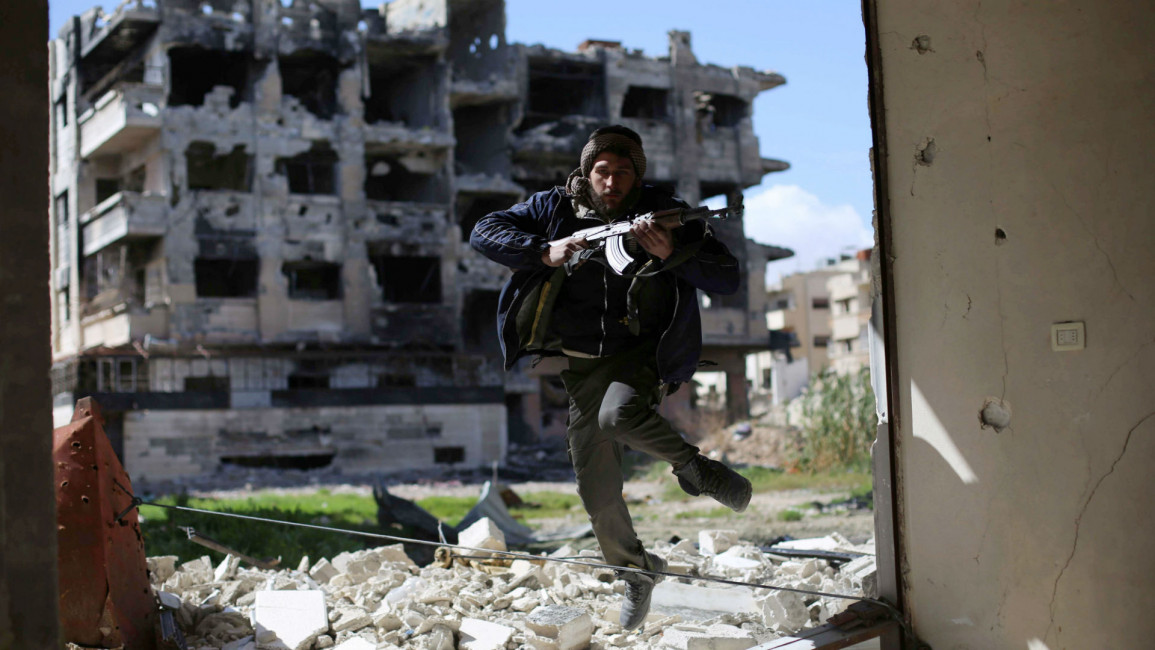
Jaish al-Islam's quiet war with its Syrian jihadi neighbours
As Syrian regime war planes pounded Aleppo, Syrian rebels holed up in the Damascus suburbs were waging war on each other.
On Saturday, rebel group Jaish al-Islam stormed an eastern Ghouta town held by fighters believed to be linked to al-Qaeda.
Tanks and artillery were used in the Jaish al-Islam assault, highlighting the ferocity of the intra-rebel war taking shape in the Damascus countryside.
More than 50 fighters from the al-Nusra Front-linked Rahman Brigades and Jaish al-Fustat were captured when Jaish al-Islam took Madira on Saturday. One Jaish al-Islam media activist was also killed in the fighting.
Now, the Saudi-backed force have managed to cut off a neighbouring town controlled by the rival rebel groups leading to hopes among locals that the war between the opposition militias will end.
Rebel bastion
Eastern Ghouta is dominated by Jaish al-Islam, one of the best performing rebel groups in the war who have repelled numerous regime offensives into the Damascus countryside.
The area has seen some of the most horrific regime attacks on civilians, with Ghouta witnessing two sickening gas attacks in 2013, which left hundreds dead.
Countless attacks on markets and bakeries in Ghouta has made anger towards the regime strong.
A week of fighting between Jaish al-Islam and brigades linked to al-Nusra Front has added another dimension to the Ghouta conflict.
Clashes reportedly started over checkpoints organised by rival rebel militias in the area.
It culminated in fire fights between Jaish al-Islam, and Feelaq al-Rahman and Jaish al-Fustat militias, which have left dozens of fighters dead.
One Jaish al-Islam fighter reportedly had his heart ripped out by an Jaish al-Fustat militant, with video footage of the brutal killing posted on social media accounts linked to the al-Qaeda-linked group.
The ferocity of the fighting reveals an intense rivalry within the rebel camp, which has seen numerous bloody outbursts.
Fears and assaults
Although Salafi in outlook, Jaish al-Islam - like other rebel groups - have been wary of being ousted from their territories by secret extremist cells.
This is what happened to many Free Syrian Army brigades in eastern Syrian when the Islamic State group captured territories from them or co-opted fighters in 2013.
 |
Jihadi groups are known to operate in areas under Jaish al-Islam control, and suspected cells are frequently raided by the rebel group.
The killing of Jaish al-Islam's founder Zahran Alloush in an air raid last December, also sparked fears of collusion between some fighters and the Syrian regime and Russia.
IS militias operate in Damascus, and several bloody assaults into Yarmouk camp, has resulted in the gory public killings of captured rebel fighters.
Jaish al-Islam's anger with IS peaked last year, when 18 captured fighters were killed by the group in a highly choreographed propaganda video.
Jaish al-Islam is firmly against IS, and what also separates it from more extremist elements is the leading role the Ghouta-based militia has taken in negotiations with the regime.
For Damascus, Jaish al-Islam represents a threat due to being powerful, popular and Islamist, but potentially palatable to the West. It is also the largest rebel group within reach of Damascus, but has committed a number of abuses on its own accord.
But its ferocious opponent of IS could soften its image.
Its more conciliatory nature has also made it an easy target for extremist groups opposed to talks with the regime.
"End the in-fighting"
The most recent incarnation of intra-rebel fighting took place as a shaky truce between the regime and rebels hangs by a thread.
Repeated air raids and government forces' assaults have continued, making it likely that the ceasefire will end at some point.
On Wednesday, regime troops advanced from the south in Jobar with Jaish al-Islam blaming the infighting on the losses.
Residents have also taken to the street to urge rival militias to end the fighting and "turn their guns on the regime".
Calls were made for an end to rebel militia checkpoints in the area, which has made "Free Ghouta" an increasingly fragmented territory.
Reports emerged that al-Nusra Front fighters fired into the crowds and made arrests of protesters, if correct, making it appear that the protests were a call for the rival militias to step into line.
Rebel groups in Aleppo and Idlib that work with both Nusra and allied to Jaish al-Islam have been bearing the brunt of recent regime assault. They have urged calm between the southern allies to allow rebels to concentrate their efforts on fighting the regime.
"We from Ahrar al-Sham movement are remaining neutral in the current fighting, and we pray for the fighters to reach the righteous decision in what will serve community against the enemies of Islam," the rebel alliance said in a statement.
What is clear is that although the ideologies of extremist groups - such as al-Nusra Front - hold little sway among Syrians.
The in-fighting between rebel groups is seen as a distraction from the real war, and fragmentation furthers the regime's aims, and gives it a little more breathing space in Damascus.


![President Pezeshkian has denounced Israel's attacks on Lebanon [Getty]](/sites/default/files/styles/image_684x385/public/2173482924.jpeg?h=a5f2f23a&itok=q3evVtko)



 Follow the Middle East's top stories in English at The New Arab on Google News
Follow the Middle East's top stories in English at The New Arab on Google News


